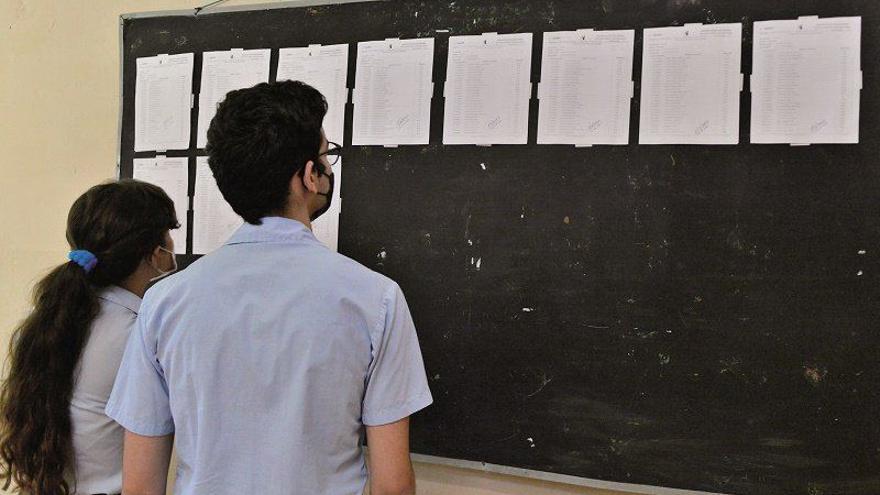
![]() 14ymedio, Havana, December 19, 2023 — Of the 2,175 students from Camagüey who promised to take the university entrance exams, 907 attended; of them, only 508 passed the Spanish, Mathematics and History syllabus. The situation of the province, which was described in detail this Monday by the official press, is just a sample of the educational debacle of the Island, where the slogan of the students has become – according to Adelante – “Why should I kill myself studying?”
14ymedio, Havana, December 19, 2023 — Of the 2,175 students from Camagüey who promised to take the university entrance exams, 907 attended; of them, only 508 passed the Spanish, Mathematics and History syllabus. The situation of the province, which was described in detail this Monday by the official press, is just a sample of the educational debacle of the Island, where the slogan of the students has become – according to Adelante – “Why should I kill myself studying?”
The article is accompanied by several graphs that illustrate the gravity of the panorama. In the province, the worst result corresponds to the main municipality, with only 37% passed, and the best to Sierra de Cristal, where 100% passed. Not even the Vocational Pre-University Institute of Exact Sciences – in the past an “elite” school – was up to the task: it passed a little more than 72%.
Another graph shows the drop in those passing since 2017, when more than 80% were able to pass the exams, to the current 59% held by the province in the 2022-2023 academic year.
The relaxation of the mechanisms of entry into higher education, the possibility of entering the university even after failing the exam and the immigration stampede that the country is going through – in which the first to leave are the young people – has given a mortal blow to a system that already had multiple deficiencies.
The entrance exams have lost their function as a “filter,” reports the newspaper, to become a mere “computer” of the promotion ladder
Adelante licks the wounds of the Ministry of Education and attributes the demotivation of the students to the lag of school years after the coronavirus pandemic. The readjustment claimed numerous victims, not only in primary and secondary education, but also in the university itself, which has not yet managed to return to the pace that was maintained before 2019.
Resolution 119 of 2021 tried to mitigate the swell of disapproved by reducing the consequences of failing the exam: since then, even if the student strikes out, he can access a career, although “those who pass have priority.” The entrance exams lost their function as a “filter,” laments the newspaper, to become a mere “computer” of the promotion ladder. The law, he adds, “encourages making things easy and lack of effort.”
The emigration of school-aged young people is mentioned in the text only in passing, since Adelante prefers to emphasize the “insufficient vocational training work” and the discouragement towards studies that prevails, also, in families.
Among the arguments about the need to toughen the mechanisms of entry into the university, according to the newspaper, is the fact that the careers that keep their aptitude tests as a filter – such as Journalism and International Relations – have the best records of each generation.
“The revolutionary principle of free and equitable access for all to universities continues to stand, and we defend it, but it cannot be used as a pretext to graduate more professionals”
“The revolutionary principle of free and equitable access for all to universities continues to stand, and we defend it, but it cannot be used as a pretext to graduate more professionals,” the article says. The alarms about the educational situation had already risen, in the national press, at the end of November, when Cubadebate published a report about admission days to the university, which were ones “of anxiety, despair and effort.”
The article commented with concern about “the true figures” of the exams: of 21,942 applicants at the national level; only 11,063 passed, a drop of 8.9% compared to the previous year. Most of the failures were in Mathematics (52%), while in Spanish (92%) and History (76%), the numbers were acceptable.
The students, it continues, had complained that the Mathematics exam was “too hard,” while the training during that course had not been the best. The officials interviewed by Cubadebate were shielded by the fact that “for more than ten years” similar questionnaires have been used, although the grades were not so disastrous.
Like Adelante, Cubadebate also avoided talking about the high number of students who emigrate before finishing high school. The abandonment, not infrequently, is calculated and kills two birds with one stone: to avoid the tension of the tests and escape, just in time, from the list of recruits for compulsory military service.
Translated by Regina Anavy
____________
COLLABORATE WITH OUR WORK: The 14ymedio team is committed to practicing serious journalism that reflects Cuba’s reality in all its depth. Thank you for joining us on this long journey. We invite you to continue supporting us by becoming a member of 14ymedio now. Together we can continue transforming journalism in Cuba.
